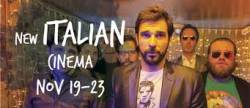 Personal sagas in a center for marginalized people in Florence
Personal sagas in a center for marginalized people in FlorenceIn Giovanni Cioni's poetic documentary he films the inhabitants (or daily visitors) of Progetto Ponterosso, a "socialization center" for marginal people in a working class district of Florence. He has said he was asked to do interviews and made this film. He doesn't seek to depict the institution or how it functions but chooses to focus on individuals, mostly one by one. From what they say, they have had addiction problems, or psychiatric problems, or criminal records, or all of the above, as well as a lack of financial means. Cioni deserves credit for working with minimal means and getting close to these people, unified through a poetic framework that alludes to the myth of the Odyssey, as if each of them were on his or her personal journey homeward through hostile lands and past dangerous temptations. The technique is minimal, sound a bit noisy sometimes, camera operated by the filmmaker who also poses questions. For the most part it works, because there is clearly commitment and humanity here, and the individuals, though sometimes terribly sad (and there are no real success stories), are vivid and real. On the other hand the film is light on the facts and information. It leaves us with a feeling of sadness and hopelessness, because it gives us the unmediated point of view of Ponterosso's population.
They have many stories to tell, and nothing much in common other than this place, missing teeth, and a smoking habit, fruits of poverty and nothing much to do. One man seems to be with his young daughter, but most of these people seem isolated from society and their families. A muscular young man describes his compulsive gambling and the humiliations he submitted to to raise the money. Several describe struggling with psychiatric problems. A woman, normal, portly, middle-class in appearance, describes going mad simply from the sound of a dry leaf crackling under foot as she walked one day along the Arno. It's been ten years since that moment and finally she's struggling to come back. A well dressed fellow has quarrels with authorities, and describes the label of CHT, Compulsive Health Treatment, meaning being overmedicated. A onetime political activist evidently is much damaged from such treatment too, and now is much less "clear" than he was a decade ago.
Another man describes working for contractors in another town for months, and returning to find the business shut down, the organizers off to jail for multiple crimes, and himself ruined and separated from his family; but he has had psychiatric issues too. He wants to see his 17-year-old daughter. An older man appears from time to time, singing Neapolitan-style ballads with a personal plangency, as if they were his own stories. There are glimpses of gatherings to sing and dance, but only glimpses. A woman, sadly it appears without a lot of her teeth and unable to speak clearly, pretties herself up for a young man she has a crush on. She seems to proposition him, and he is noncommittal. Finally, some of the inmates appear down by the beach bathing, bringing the recurrent shots of waves and inter-title questions of questions to Ulysses face-to-face with the people we've been listening to.
Per Ulisse (
For Ulysses), 90 mins., debuted with in the Visions du Réel Film Festival, Switzerland, 24 April 2013. Zeugma Films. Screened as part of the San Francisco Film Society's 2014 New Italian Cinema Series, November 19-23, 2014. Showing November 21, 2014, 4:30 p.m. at the Vogue Theater, San Francisco.






